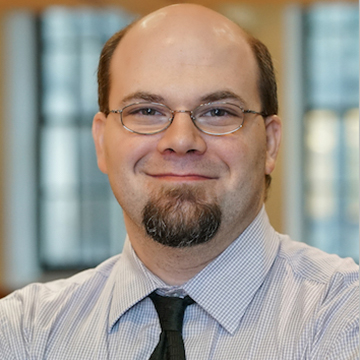Informatics Insights with Luke Rasmussen
Luke Rasmussen, MS, FAMIA, is a senior clinical research associate of Biostatistics and Informatics in the Department of Preventive Medicine. He earned his Master of Science in medical informatics at Northwestern University, where he continues to work at the intersection of software engineering and informatics. He has spent more than 20 years developing solutions to support biomedical research and his research interests include making reproducible research easier to achieve and exploring secondary uses of electronic health record data. Rasmussen is a member of the Northwestern University Clinical and Translational Sciences (NUCATS) Institute and the Institute for Artificial Intelligence in Medicine (I.AIM).
What’s your background?
My background is in Information Systems — this gave me the training to have a very applied focus on software development. My first job after completing my undergrad was contributing to the development of the homegrown electronic health record (EHR) system at Marshfield Clinic in Wisconsin.
How did you get into the informatics space?
After spending a few years as an EHR developer, I heard a talk by Dr. Justin Starren who was hired to lead a new Biomedical Informatics Research Center at Marshfield. In an hour he had me hooked on this field I had never heard of before, but it was exciting to see how informatics could make a big impact to clinical research and clinical care. I was fortunate enough to be selected as his first programmer hire in the new center, and to work closely with him over the years. I also continued my education, earning a Master’s in Medical Informatics here at Northwestern, and I just recently started pursuing a PhD in the field.

One benefit of being a generalist means that I get to collaborate with a lot of different groups on campus ... I work a lot right now with NUDACC, I.AIM, Center for Genetic Medicine, Pulmonary and Critical Care, and Medical Social Sciences.”
What has been your greatest challenge?
My greatest challenge has been the fact that I find everything we do interesting! While my primary interest is in computable phenotyping (how we select cohorts of patients using EHR data), I’m also interested in research software engineering, data privacy, information security, clinical decision support… you get the idea. This means that I’m more of a generalist than a specialist in any particular topic, which is not always a good thing. I need to be able to dive in and learn the details of new technologies or domains for any given project — fortunately I love to learn, and I work with amazing collaborators who are willing to spend the time teaching me new concepts.
Informatics and data science are very collaborative. Who/what organizations/institutions do you collaborate with?
One benefit of being a generalist means that I get to collaborate with a lot of different groups on campus. Outside of all the great folks in NUCATS and in my home department, I work a lot right now with NUDACC, I.AIM, Center for Genetic Medicine, Pulmonary and Critical Care, and Medical Social Sciences. In addition, because I am often involved with technical infrastructure on my various projects, I am frequently working with the amazing folks in FSM IT and NM IT.
What are you excited about in the field of informatics right now?
I’m certainly excited about the growth in study, exploration, and implementation of artificial intelligence (AI), including large language models (LLMs). Outside of the demonstrated gains we’ve seen from these technologies, I’m also excited to see that many people in the field are approaching it with a realistic mindset. That is — it’s good to be excited about the potential of AI/LLMs, without succumbing to the hype. It’s encouraging to know we have very smart and well-respected people at Northwestern considering reproducibility, ethical, security, and privacy issues of these new technologies to guide their adoption.
Join the Health Informatics Collaborative
The NUCATS Health Informatics and Data Science Collaborative fosters innovation, collaboration, and a sense of community among informaticists at Northwestern University. All are welcome to join, especially faculty, staff, students, and others on the Chicago and Evanston campuses. Regular events are convened, and opportunities are shared to spur innovation and offer support around information technology and data processes related to health.
Join the Collaborative




